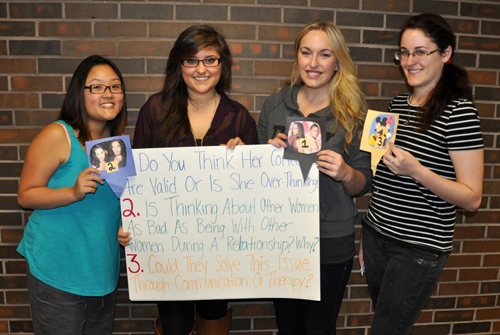At Guelph presents this story as part of a series that highlights University of Guelph leadership in teaching excellence and the scholarship of learning.

What would you do if you found yourself or a friend in an unhealthy dating relationship? That’s one of the questions that students in Prof. Karl Hennig’s clinical psychology seminar are asking local high school students to think about.
Now in its fifth year, the seminar is part psychology course, part intervention program. It’s designed to give U of G psychology students the opportunity to apply what they have learned in class by teaching teens about dating violence and healthy relationships.
“This is the one opportunity where they get to do something that’s applied,” says Hennig, Department of Psychology, “and students routinely have told me that this is the best course they have ever taken.”
The 75-minute classes are led by U of G students who use a variety of interactive techniques, such as role-playing and discussion groups, to get their message across.
“A lot of kids might feel uncomfortable asking these questions because they don’t want their parents to know they’re in a bad relationship,” says Melanie Brouchu, a fourth-year psychology student.
Teens are also more likely to talk to their peers about dating and relationship issues because they feel they can relate better. “When it comes from a parent, it sounds like a lecture,” says Ivana Popadic, also a fourth-year psychology student.
Most of the participating high schools are from the Wellington Catholic District School Board. As part of the program, groups of U of G students are teamed with a high school teacher. The students visit the school to observe the classroom dynamics and adapt their presentation, which is based on lessons from a manual that Hennig covers in his class.
The lessons address issues such as how to identify “red flags” in an unhealthy or abusive relationship, sexual consent, conflict resolution, communication skills and breaking up. A guest speaker who was involved in an unhealthy relationship also visits the school to talk about his or her own personal experience.
“You want to be challenged,” says Hennig. “Healthy relationships involve some challenge, but at what point does the discomfort in the relationship mean that it’s just not a good relationship to be in?”